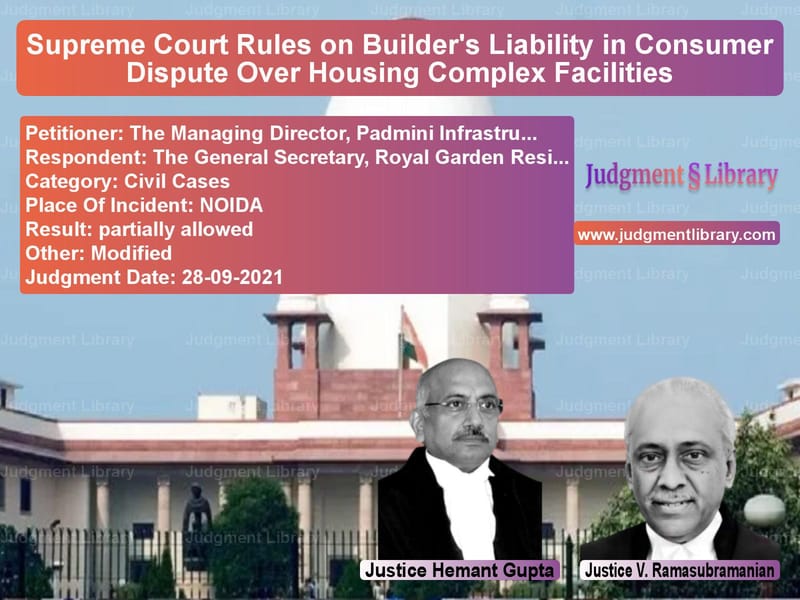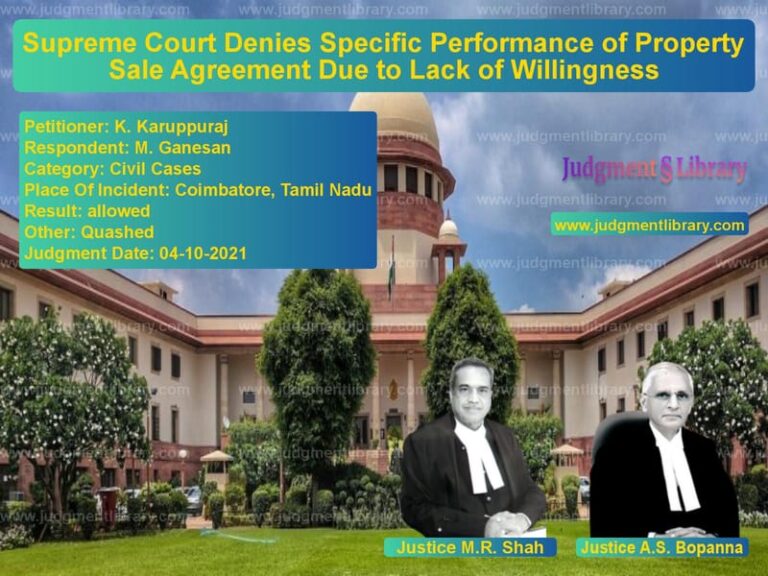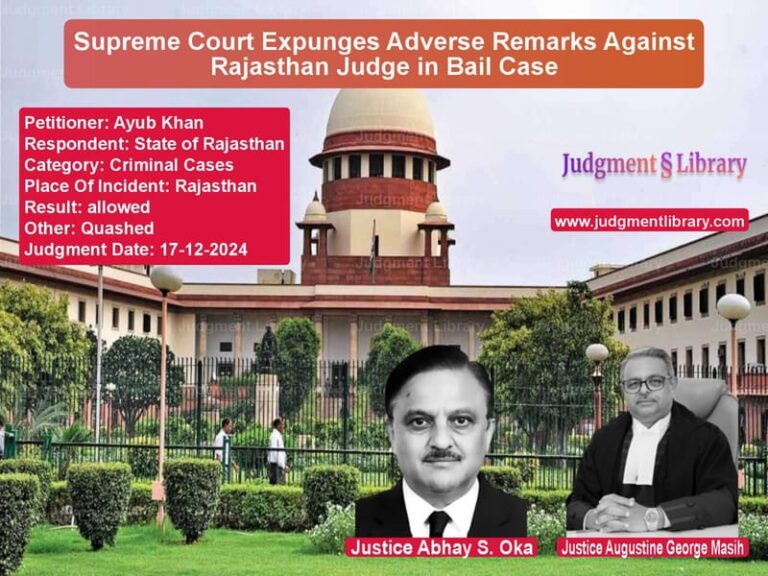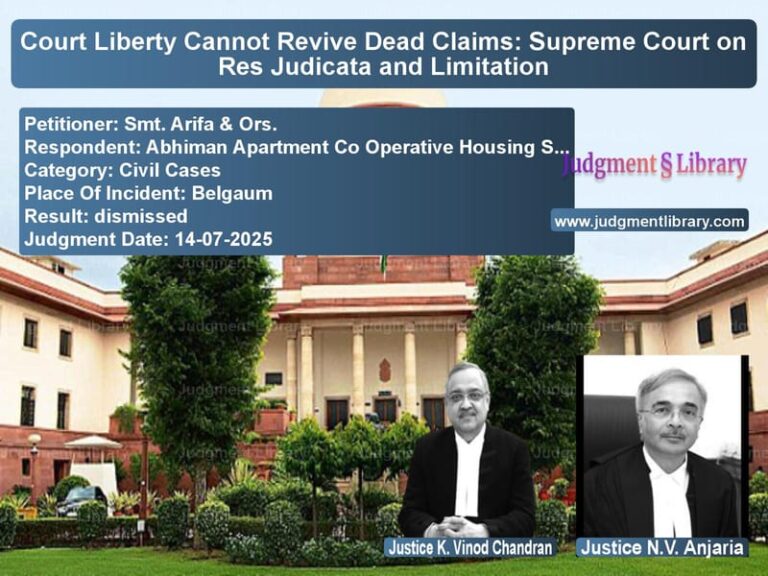Supreme Court Rules on Builder’s Liability in Consumer Dispute Over Housing Complex Facilities
The Supreme Court of India, in the case of The Managing Director, Padmini Infrastructure Developers (I) Ltd. vs. The General Secretary, Royal Garden Residents Welfare Association, addressed significant issues concerning the responsibilities of builders towards homebuyers, the maintenance of residential complexes, and the enforceability of commitments made at the time of sale.
Background of the Case
This dispute arose from a residential apartment complex developed by Padmini Infrastructure Developers (India) Ltd. in NOIDA. The developer constructed around 282 apartments and handed over possession between 1998 and 2001. However, the completion certificate was only issued in December 2001.
In 2003, the residents formed the Royal Garden Residents Welfare Association (RWA) and signed an agreement with the builder on 15.11.2003 to take over maintenance responsibilities. Later, in 2007, the RWA filed a complaint before the National Consumer Disputes Redressal Commission (NCDRC), alleging that the builder had failed to provide promised amenities and maintain the property properly.
Claims Made by the Residents’ Association
The RWA sought several reliefs from the NCDRC, including:
- Payment of maintenance charges for unsold flats amounting to Rs. 9,05,810.
- Completion of the water softening plant.
- Completion of the fire-fighting system and obtaining a fire safety certificate.
- Furnishing and equipping a second health club.
- Completion of a second swimming pool.
- Provision of a furnished club house in the basement of Eden Tower.
- Eviction of tenants from the terrace of Tower Eden, which was allegedly rented out without residents’ consent.
- Prohibition on the sale or renting of unsold flats until all facilities were provided.
- A direction preventing the builder from selling stilt and open car parking spaces.
- Compensation for mental agony and harassment.
Builder’s Defense
The builder resisted the complaint, arguing that:
- The complaint was time-barred under the Consumer Protection Act.
- All promised facilities had been provided and any remaining issues were due to poor maintenance by the residents’ association.
- The agreement with the RWA contained an arbitration clause, making the consumer complaint invalid.
- There was no contractual obligation to provide a second health club.
- The fire-fighting system and water softening plant were operational at the time of handover.
Findings of the National Consumer Commission
The NCDRC appointed an independent architect to inspect the complex and determine the validity of the residents’ claims. The architect’s report highlighted serious deficiencies, including:
- The water softening plant was incomplete and non-functional.
- The fire-fighting system was never fully commissioned, and some equipment was missing.
- The second swimming pool was non-functional as its filtration system was incomplete.
- The second health club was unfinished and lacked adequate furnishings.
- The basement club house in Eden Tower was locked and used for storage by the builder.
Based on this report, the NCDRC ruled in favor of the residents and ordered the builder to complete the pending work within ten weeks or pay the cost estimated by the architect. The estimated costs included:
- Water softening plant: Rs. 20,29,962
- Fire-fighting system: Rs. 83,00,000
- Second health club: Rs. 7,60,000
- Second swimming pool: Rs. 2,70,000
- Club house furnishing: Rs. 2,75,000
Total estimated cost: Rs. 1.16 crore
Supreme Court’s Judgment
1. Limitation Issue
The builder argued that the complaint was time-barred under the Consumer Protection Act, which allows claims within two years of the cause of action. However, the Supreme Court noted that:
“The cause of action continued at least until December 2005, as the builder was still carrying out works related to fire-fighting and other amenities. Since the complaint was filed in February 2007, it was within the limitation period.”
2. Builder’s Obligation to Complete Facilities
The Supreme Court upheld the NCDRC’s findings that the builder had failed to deliver promised amenities:
“If all the aforesaid services had been handed over in a fully functional state, the opposite party should have taken an acknowledgment in writing from the complainant.”
Thus, the builder was held responsible for the completion of pending works.
3. Monetary Compensation Instead of Work Completion
Given that the residents had already taken over maintenance in 2003, and the case had been pending for many years, the Supreme Court modified the NCDRC order. Instead of asking the builder to complete the works, it ruled:
“The complainant shall receive Rs. 60 lakhs, already deposited in the Supreme Court, in full and final settlement towards the reliefs sought for incomplete amenities.”
4. Direction to Hand Over Club House
The Court further ordered:
“The builder shall remove all building material stored in the club house and hand over possession of the club house in the basement of Eden Tower to the complainant within two weeks.”
5. Denial of Other Reliefs
The Supreme Court upheld the NCDRC’s rejection of certain claims, including:
- Maintenance charges for unsold flats: The claim was partly time-barred and lacked sufficient proof.
- Eviction of tenants from the terrace: The complaint should have been filed in an appropriate civil court.
- Ban on selling parking spaces: No contractual provision was cited to justify this claim.
- Compensation for mental agony: Since the complaint was filed in 2007, nearly four years after the maintenance takeover, it was not justified.
Conclusion
The Supreme Court’s ruling in The Managing Director, Padmini Infrastructure Developers (I) Ltd. vs. The General Secretary, Royal Garden Residents Welfare Association is a landmark decision reinforcing the rights of homebuyers and the obligations of builders. It clarifies that:
- Builders are accountable for delivering all promised amenities.
- Residents’ associations have the right to claim compensation for deficiencies in construction and facilities.
- Long delays in litigation can lead to monetary compensation instead of specific performance.
This judgment serves as a crucial precedent in real estate consumer disputes, ensuring that developers adhere to commitments made at the time of sale.
Petitioner Name: The Managing Director, Padmini Infrastructure Developers (I) Ltd..Respondent Name: The General Secretary, Royal Garden Residents Welfare Association.Judgment By: Justice Hemant Gupta, Justice V. Ramasubramanian.Place Of Incident: NOIDA.Judgment Date: 28-09-2021.
Don’t miss out on the full details! Download the complete judgment in PDF format below and gain valuable insights instantly!
Download Judgment: the-managing-directo-vs-the-general-secretar-supreme-court-of-india-judgment-dated-28-09-2021.pdf
Directly Download Judgment: Directly download this Judgment
See all petitions in Consumer Rights
See all petitions in Property Disputes
See all petitions in Damages and Compensation
See all petitions in Contract Disputes
See all petitions in Judgment by Hemant Gupta
See all petitions in Judgment by V. Ramasubramanian
See all petitions in partially allowed
See all petitions in Modified
See all petitions in supreme court of India judgments September 2021
See all petitions in 2021 judgments
See all posts in Civil Cases Category
See all allowed petitions in Civil Cases Category
See all Dismissed petitions in Civil Cases Category
See all partially allowed petitions in Civil Cases Category







